2017 SkS Weekly Climate Change & Global Warming Digest #12
Posted on 26 March 2017 by John Hartz
Story of the Week... El Niño/La Niña Update... Toon of the Week... Quote of the Week... He Said What?... Graphic of the Week... SkS in the News... Photo of the Week... SkS Spotlights... Video of the Week... Coming Soon on SkS... Poster of the Week... Climate Feedback Reviews... SkS Week in Review... 97 Hours of Consensus...
Story of the Week...
Ice at Both Poles Shrinks to Record Lows

Here's another entry in the parade of sobering climate change records: The National Snow and Ice Data Center announced Wednesday that Arctic sea ice hit its maximum extent for the year on March 7, and it was the lowest in the 38 years of satellite records.
The total ice coverage as the winter drew to a close was 471,000 square miles less than the 1981-2010 average—meaning ice larger than the combined size of California, Oregon, Washington and Nevada failed to form this year.
"We have had three record-setting low years of maximum sea ice extent in a row," said Walter Meier, a research scientist specializing in sea ice at NASA's Goddard Space Flight Center.
After decades of expansion, the sea ice surrounding Antarctica, where the summer is just ending, also hit a record low, NSIDC reported. Its minimum extent for year was reached on March 3, and was roughly 900,000 square miles below the 1981-2010 late-summer average.
Ice at Both Poles Shrinks to Record Lows by Sabrina Shankman, InsideClimate News, Mar 22, 2017
El Niño/La Niña Update
The odds of El Niño's development by the late summer or early fall have increased, according to the latest output from forecast model guidance.
NOAA's Climate Prediction Center (CPC) officially declared La Niña's end in early February as sea temperatures have steadily warmed in the equatorial region of the central and eastern Pacific, and we're now in the neutral phase of the oscillation. Neutral means that neither La Niña or El Niño conditions exist.
As shown below, models currently suggest we'll be in the neutral category through the spring and into the early summer months (April-May-June, or AMJ), but after that, sea temperatures could be warm enough for El Niño conditions to take over.
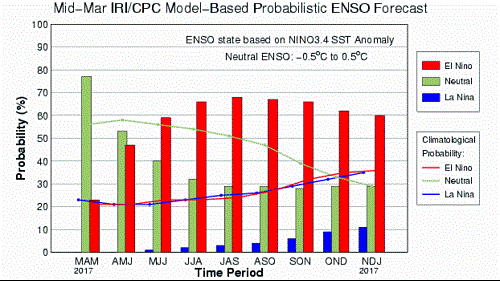
The chance for various phases of El Niño, according to IRI's mid-March model-based probabilistic forecast. Red bars show the probability of El Niño's development during each three-month period. (International Research Institute for Climate and Society)
El Niño's Odds to Return By Late Summer or Fall Increasing by Jonathan Belles & Brian Donegan, WunderBlog, Weather Undergound, Mar 23, 2017
Toon of the Week...
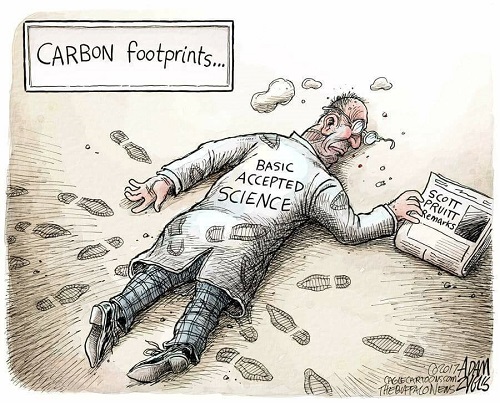
Quote of the Week...
From "Sense and Sensibility" to "Love Actually" and "Nanny McPhee", British actress Emma Thompson is known for her memorable roles in costumes dramas, comedies and fantasy films.
But like fellow Oscar winner Leonardo DiCaprio, the 57-year-old is also an avid environmental campaigner, seeking to raise awareness on issues such as fracking and climate change.
"I think that we've all got to shout as loudly as we can," Thompson told Reuters in an interview. "Ordinary people now need to know more. They need to inform themselves. You can't just sit back and go 'look, I recycle'."
The actress was speaking in Sweden, where she is adding her voice to fellow activists' criticism of Norway's plans to open up more oil and gas exploration in the Arctic.
Emma Thompson says wants people to 'shout loudly' about climate change by Ilze Filks, Reuters, Mar 24, 2017
He Said What?...
“There is little doubt that we are living in a warm period,” said Ole Humlum, a physical geography professor at the University Centre in Norway and author of the GWPF report.
Humlum is a global warming skeptic who’s spent decades studying glaciers and climate. Humlum argues that while the world is warming, it’s well within the bounds of natural variability.
“However, there is also little doubt that current climate change is not abnormal and not outside the range of natural variations that might be expected,” Humlum said.
REPORT: Current Global Warming Is ‘Not Outside The Range Of Natural Variations’ by Michael Bastasch, The Daily Caller, Mar 23, 2017
Graphic of the Week...
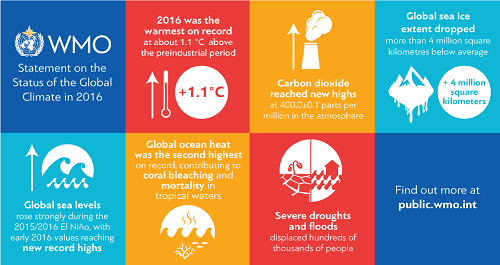
Climate breaks multiple records in 2016, with global impacts., WMO Press Release, Mar 21, 2017
SkS in the News...
[To be added.]
Photo of the Week
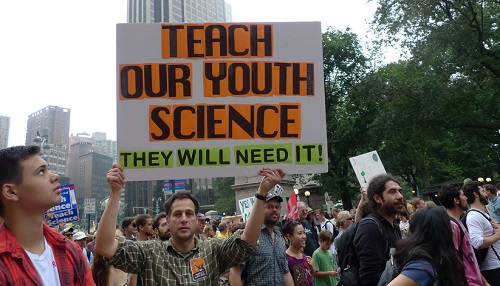
Image credit: Peoples Climate March 2014 in NYC, by Susan Melkisethian via Flickr CC
SkS Spotlights...
START promotes research-driven capacity building to advance knowledge on global environmental change in Africa and Asia-Pacific. We accomplish this through research grants and fellowships, knowledge assessments and syntheses, curricula development, advanced training institutes, multi-stakeholder dialogues, and place-based strategic planning. Our work focuses on climate variability and change, disaster risk reduction, land-use/land-cover change, biodiversity conservation, urban development, human health, water resources management, agriculture and food security, and regional climate modeling and climate services. START’s actions target science, as well as the interface of science, policy and practice, and inform actions toward fostering more resilient and adaptable development.
Video of the Week...
If You Love Your Children http://www.ifyouloveyourchildren.org a 2014 Canadian short film – depicting climate change, directed and produced by Sanjay Patel. The film has received many awards and nominations since its release in August 2014.
If You Love Your Children https://en.wikipedia.org/wiki/If_You_Love_Your_Children
Climate Change Film: If You Love Your Children, Climate State, Mar 17, 2017
Coming Soon on SkS...
- PBs is the only network reporting on climate. Trump wants to cut it (Dana)
- Dear Mr President #2 - all about the discovery of the Greenhouse Effect (John Mason)
- Trump launches an all-out offensive in the war on science (Dana)
- Sea ice falls to record lows in both the Arctic and Antarctic (Roz Pidcock)
- Guest Post (John Abraham )
- 2017 SkS Weekly Climate Change & Global Warming News Roundup #13 (John Hartz)
- 2017 SkS Weekly Climate Change & Global Waming Digest #13 (John Hartz)
Poster of the Week...
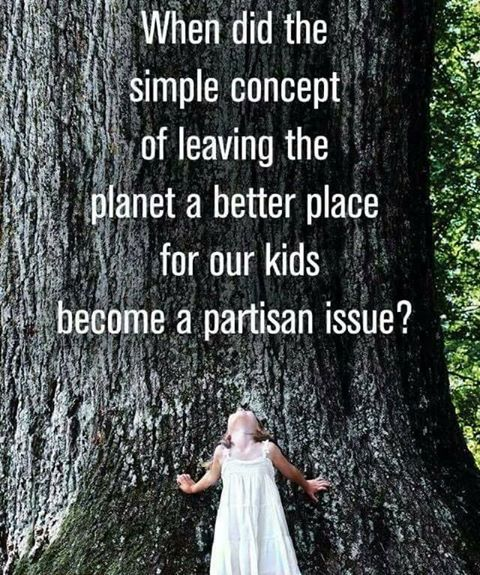
Climate Feedback Reviews...
Climate Feedback asked its network of scientists to review the article, Record-breaking climate change pushes world into ‘uncharted territory’ by Damian Carrington, Guadian. Mar 20, 2017
Eight scientists analyzed the article and estimated its overall scientific credibility to be ‘high’ to ‘very high’. A majority of reviewers tagged the article as: Accurate.
Click here to access the entire review.
SkS Week in Review...
- 2017 SkS Weekly Climate Change & Global Warming News Roundup #12 by John Hartz
- Elevator Pitches - Chapter 02 - Radiative Gases by Rob Honeycutt
- New Video: It’s Alive – Microbes and Melt on the Greenland Ice Sheet by Peter Sinclair (Climate Denieal Cock of the Week)
- Global warming is increasing rainfall rates by John Abraham (Climate Consensus - the 97%, Guardian)
- In-depth: What Donald Trump’s budget means for US spending on climate change by Roz Pidcock (Carbon Brief)
- 19 House Republicans call on their party to do something about climate change by Dana Nuccitelli (Climate Consensus - the 97%, Guardian)
- 2017 SkS Weekly Climate Change & Global Warming Digest #11 by John Hartz
97 Hours of Consensus...
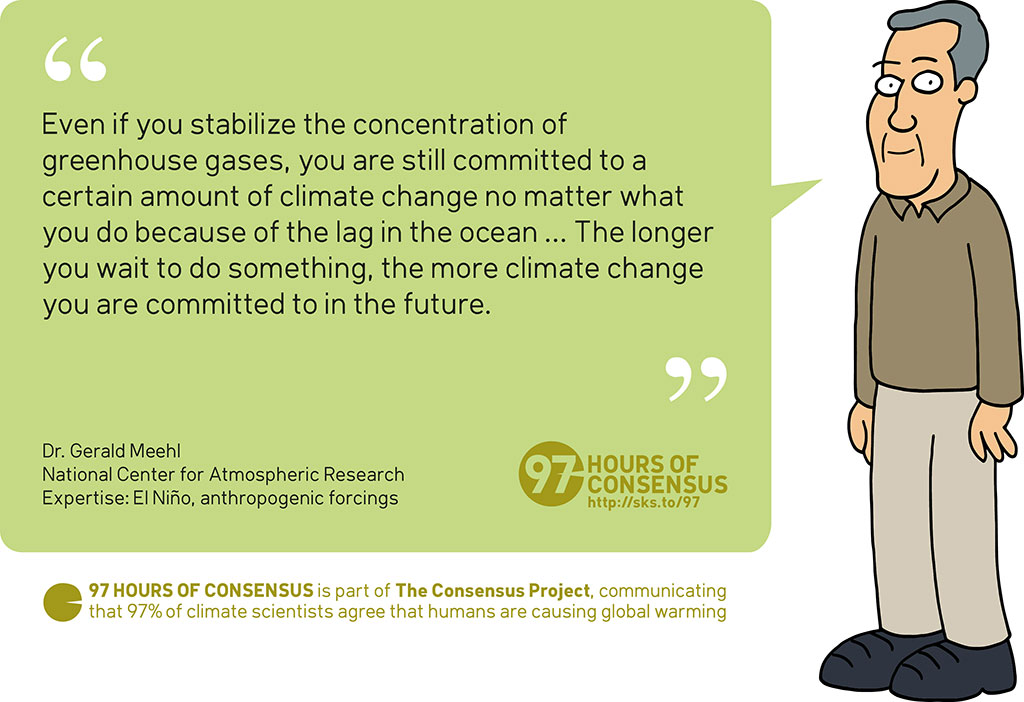
Quote shortened from:
" "Even if you stabilize the concentration of greenhouse gases, you are still committed to a certain amount of climate change no matter what you do because of the lag in the ocean," said Gerald Meehl, a climate scientist with the National Center for Atmospheric Research in Boulder, Colorado.
Greenhouse gases such as carbon dioxide collect in the atmosphere and are believed to act as a blanket, trapping heat and causing the Earth to warm. To stop this warming, many scientists say humans must reduce the amount of greenhouse gases they emit.
Human activities that make the largest contributions to greenhouse gases include exhaust fumes from automobiles and commercial jets and emissions from power stations and factories.
"The longer you wait to do something, the more climate change you are committed to in the future," Meehl said. "































 Arguments
Arguments






























Comments